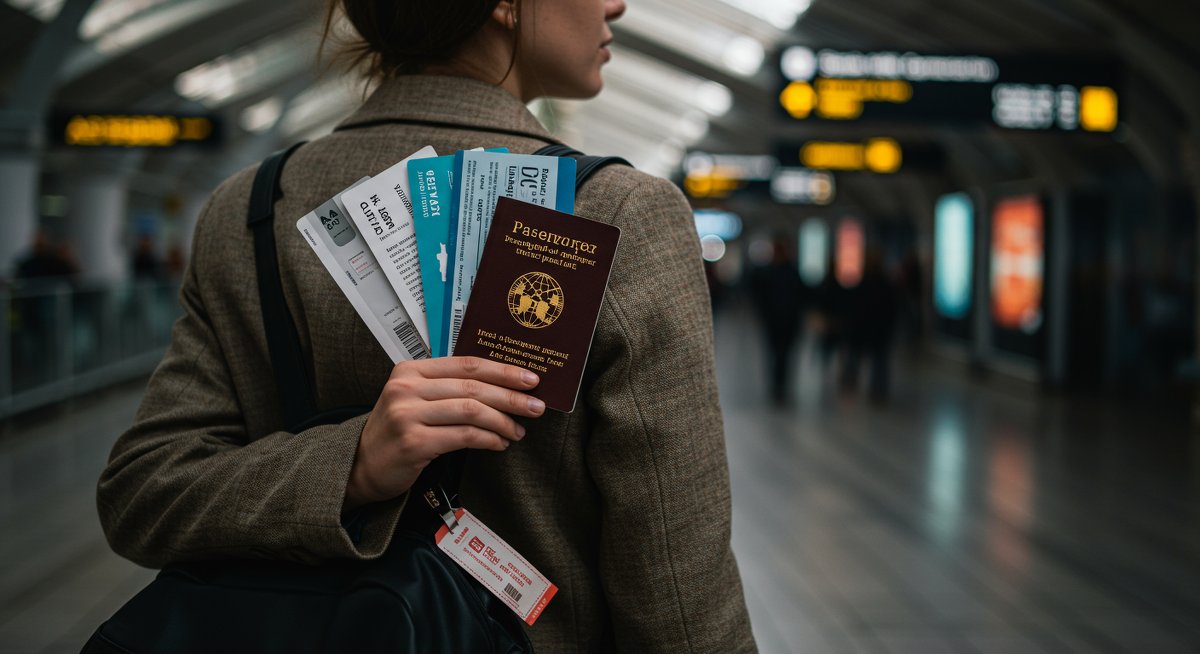Losing your passport while traveling internationally is a nightmare scenario. It can disrupt your entire trip, leaving you stranded and stressed. But don't panic. This guide provides a clear, step-by-step action plan to help you recover your passport and get back on track. We'll cover everything from immediate actions to long-term solutions, ensuring you're prepared for any situation. This guide is designed for experienced travelers, but it's also useful for anyone who wants to be prepared for the unexpected. Let's dive in and turn this crisis into a manageable situation.

The problem: What's really happening
When your passport disappears, you face more than just the loss of a document. You're dealing with potential identity theft, travel disruption, and emotional stress. The clock is ticking, and every decision matters. Understanding the scope of the problem is the first step towards a solution.
Consider this: you're in Rome, enjoying the Colosseum, and you realize your passport is gone. Beyond the immediate shock, you have to consider: can you still access your hotel room? What about your return flight? Are your credit cards safe? The loss of your passport impacts every aspect of your trip, and without immediate action, you could face significant financial and personal hardship. You may be thinking, “This won’t happen to me,” but unfortunately, it happens to travelers every day.
Another aspect of the problem is the potential for identity theft. Your passport contains sensitive personal information. If it falls into the wrong hands, it can be used for fraudulent activities. This risk highlights the need for immediate reporting and security measures.
Why this affects international travelers
International travelers are uniquely vulnerable. They're often in unfamiliar environments, dealing with language barriers, and navigating complex legal systems. The loss of a passport can result in:
- Immigration issues: Without a passport, you can't legally leave the country or enter another.
- Financial strain: Replacing a passport can be expensive, and you may incur additional costs for accommodation, flights, and other travel expenses.
- Emotional distress: Being stranded in a foreign country is incredibly stressful.
For example, imagine losing your passport in Thailand. You might need to visit the local police station, the embassy, and the immigration office. Each step involves time, paperwork, and potential costs. You may be far from home with limited access to support systems.
The impact extends beyond the immediate inconvenience. It can lead to missed flights, hotel cancellations, and even legal complications, especially if you're in a country with strict immigration policies. This is why a swift, well-planned response is essential.
Root causes analysis
Passport loss happens for various reasons, including:
- Theft: Pickpockets often target travelers in crowded areas.
- Misplacement: Passports can be easily left behind at restaurants, hotels, or on public transport.
- Damage: Passports can be damaged by water, fire, or other accidents.
Understanding these root causes can help you take preventative measures. For example, if you are in a busy market, keep your passport in a secure, zippered pocket or a money belt. If you are prone to misplacing items, keep your passport in the same place at all times, and create a digital copy. Remember, a little foresight can save a lot of trouble.
Example 1: A traveler in Barcelona had their passport stolen at a crowded metro station. The theft was swift, and the passport was gone before they knew it. Fortunately, they had taken precautions, such as keeping copies of their passport and important documents. They reported the theft to the police immediately and contacted their embassy.
Example 2: A family on a cruise misplaced their passports while disembarking in Italy. They were rushing to catch a tour and left their passports on a table. The mistake delayed their trip. The family learned the importance of having a designated place for their passports and double-checking before leaving any location.
Example 3: A solo traveler in Peru accidentally damaged their passport during a hiking trip. The document was soaked in rain, making it illegible. They had to seek emergency assistance from the embassy to obtain a replacement.
Step-by-step solution framework
Here’s how to handle a lost passport abroad, broken down into actionable steps:
- Report the loss immediately: File a police report to document the loss. This report is crucial for your insurance claim and embassy assistance.
- Contact your embassy/consulate: They will guide you through the replacement process and issue a temporary travel document if needed.
- Gather required documents: You'll need copies of your passport (if available), identification, and any other supporting documents. The embassy will provide a list of what's needed.
- Apply for a replacement passport: Follow the embassy's instructions to apply for a new passport. This may involve submitting an application form, photos, and fees.
- Obtain temporary travel documents: If you need to return home urgently, the embassy can issue an Emergency Passport or a Letter of Identity.
- Inform relevant parties: Notify your airline, hotel, travel insurance provider, and bank.
It is always best to act fast and follow the official guidelines. For example, if you are in Japan, the first step is to contact the local police and file a police report. Then, contact your country's embassy to begin the replacement process. Every step has a purpose, and each one contributes to a successful resolution.

Prevention strategies
Preventing passport loss is the best solution. Here are essential strategies:
- Make copies: Keep physical and digital copies of your passport and other essential documents (driver's license, visas, etc.). Store them separately from your passport.
- Secure your passport: Use a money belt, a hidden pocket, or a secure bag to carry your passport. Be vigilant in crowded areas.
- Stay organized: Always know where your passport is. Designate a specific place for it in your luggage or hotel room.
- Register with your embassy: Enroll in your country's travel registration program. This allows the embassy to contact you in an emergency.
These are the basics, but they are extremely important. Always have copies of all your important documents in multiple locations. This makes the recovery process smoother and faster if you do lose your passport. A little planning makes all the difference.
When to seek professional help
While this guide provides a comprehensive framework, sometimes you need professional help. Consider these scenarios:
- Complex situations: If you face legal issues or require assistance navigating local bureaucracy.
- Difficulty communicating: If you encounter language barriers or have trouble understanding local procedures.
- Urgent travel needs: If you need to return home immediately or have critical travel commitments.
In such cases, consider contacting:
- Travel insurance provider: They can provide assistance and cover some expenses.
- Legal professionals: If you require legal support.
- Embassy/Consulate: For all types of official assistance.
International legal protections
International law offers several protections. Treaties and conventions often ensure that consular assistance is provided to citizens abroad. The Vienna Convention on Consular Relations outlines the rights of consular officers to assist their citizens. You can use this information to understand your rights and seek appropriate help.
Your action checklist
Here’s a quick checklist to keep handy:
- Report to the local police.
- Contact your embassy or consulate.
- Gather copies of your passport and other documents.
- Complete the passport replacement application.
- Obtain temporary travel documents if required.
- Notify your travel insurance provider, airline, and bank.
- Keep a record of all communications and expenses.
This checklist can save you valuable time and reduce your stress level. Keep this list in a safe place, and refer to it if the unfortunate event occurs. The best approach is to be prepared, so take action now before your next trip.
Next steps in your travel journey
Recovering from a lost passport is a learning experience. After resolving this issue, take these steps to improve your travel safety:
- Review your travel insurance: Ensure you have adequate coverage for lost documents, medical emergencies, and trip interruptions. Consider upgrading your coverage or changing providers.
- Update your travel documents: Make sure your passport is valid and that you have the necessary visas for your next trip.
- Plan for future trips: Consider other potential risks while traveling (theft, health issues, natural disasters, etc.) and develop backup plans.
- Share your experience: Tell others about your experience so they can learn from your mistakes. Sharing can also help others understand and avoid similar problems.
If you’re on this journey too, I’d love to hear how it goes for you. Please feel free to share your experiences and tips in the comments. Safe travels!